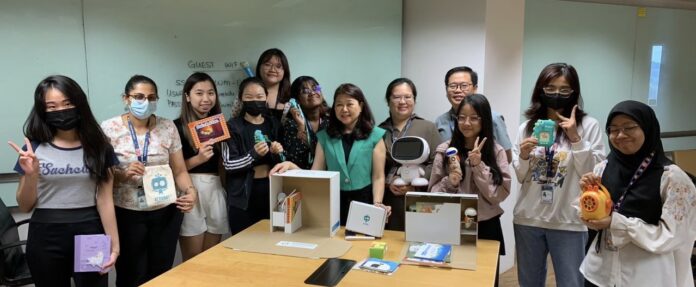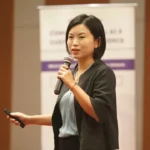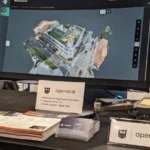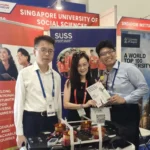Grace Chow的ACTIVBOT愿景深入探索了人工智能(AI)与机器人技术在幼儿园教育中的创新融合。通过一场富有洞察力的访谈,Grace分享了她在提升早期教育质量、弥合教育差距方面的创新方法。接下来,让我们一起了解ACTIVBOT如何在亚洲改变教育的未来。 精彩内容认识Grace Chow:将AI引入课堂的创新者访谈:ACTIVBOT创始人Grace Chow弥合教育中的数字鸿沟 认识Grace Chow:将AI引入课堂的创新者 Grace Chow是ACTIVBOT的创始人,这是一家位于马来西亚的教育技术初创公司。最初,她的职业生涯始于Tadika Aktif,这是一所融合STEM教育和AI解决方案的先锋幼儿园。Grace对早期儿童教育的热情最终促使她创立了ACTIVBOT,旨在为年轻儿童和特殊需求学生提供更好的学习体验。她还曾在多个教育技术会议上发言,并因其在教育技术领域的贡献而获得了多个奖项,包括在新加坡EduTech会议上获得的特殊需求新兴技术奖。 在这次访谈中,Grace分享了她的创业历程、面临的挑战以及她对AI和机器人技术在幼儿园教育中应用的见解。她还展望了早期教育的未来,并阐述了自己如何弥合数字鸿沟的愿景。 访谈:ACTIVBOT创始人Grace Chow Q: 您的创业想法是什么时候萌生的? Grace Chow: 我在成功经营幼儿园后,想要为社区做出贡献。经过十年的经营,我发现老师们的压力越来越大,因为小学一年级的准备工作要求非常高。我不希望孩子们只能通过枯燥的补习班来学习。我关心他们,超越了幼儿园的教学。我也希望能继续享受经营幼儿园的乐趣,因此必须找到更好的方式。这促使了我在早期教育中整合AI和机器人技术的创新想法。 Q: 有什么个人经历激发了您的想法吗? Grace Chow: 我的老师借给我一本书,叫《大脑中的阅读——我们如何阅读的新科学》,作者是Stanislas Dehaene。我听说大脑像海绵一样,可以吸收三种语言。而I-Lab的Dr. Kuhl强调了“五岁之前的重要性”。人类无法在缺乏足够幼儿园教师的情况下实现这一点,特别是因为并非每位老师都懂得三种语言。因此,我决定我们需要机器人和AI来解决这些问题。后来,这个经历促使我将AI和机器人技术整合进幼儿园教育。 Q: 有没有什么偶然的机遇或事件激发了您的创意? Grace Chow: 我将这个想法提交给了EduTech新加坡会议,并且得到了接受。在那个时候,市场上没有机器人。事实上,我还给我们的总理写了信,建议我们开始制造机器人。同时,我曾与一些神经科学教授合作,但他们的院长并没有批准。于是,我决定去中国寻找自己的解决方案。起初,这些机器人非常基础,因为我不得不在技术上做很多权宜之计。如今,它们已经完全基于AI,并且运行良好。在一次去中国的旅行中,我发现了一款非常可爱的AI笔,它能很好地教授中文和英语。我将它加入了我的机器人计划中。这段经历体现了许多偶然的机遇,它们激发了我将AI和机器人技术融入幼儿园教育的创意。 Q: 能否描述一下您如何完善和澄清最初的创意? Grace Chow: 我真的能看到我所想象的东西变成现实,这让我非常感激。接下来,我决定将这些机器人和AI笔带到特殊需求学校进行测试。我的一位学生的妈妈是老师,她提到他们对阅读并不感兴趣。令我惊讶的是,当我到场时,他们表现出了极大的兴趣。第二天,他们甚至主动要求老师安排更多阅读课程。我将这一成果提交给了EduTech新加坡,并获得了新兴技术奖。之后,Covid疫情爆发,我们的幼儿园因为每个孩子都有自己的AI笔组,而准备充分。 对于机器人,我们不得不轮流使用,因为对于小孩子来说,仅仅依靠线上课程并不有效。而Jolly Phonics的课程内容也比较专业,家长们也需要学习。我迅速将所有课程录制下来,并将其整合进机器人中。这一过程中,我不断完善和澄清最初的创意,适应了在幼儿园教授多语言的挑战,确保能够有效地将AI和机器人技术整合进教育。 Q: 您的创业想法如何与您的热情和价值观相契合? Grace Chow: 世界教育大会授予了我全球教育技术领导奖。我为培训支持建立了一个专业的LMS平台,名为DIPES。疫情后,我将我们的机器人捐赠给了孤儿院。普通教师发现教授这些内容非常具有挑战性,因为他们无法专心教学。但是,使用我们的解决方案后,效果非常好;每个孩子都喜欢。我们的愿景是让每个孩子都能阅读。教育对贫困家庭来说至关重要,我希望缩小富人和穷人之间的数字鸿沟。现在,ACTIVBOT配备了适量的Jolly Readers和麦克风,学习阅读变得如此互动且价格实惠,让每个人都能进行教学和学习,而无需支付高昂的租赁费用。 接下来,最棘手的问题出现了,孩子们过度使用手机。我决心通过推出ACTIVBABY来终结这一现象,并通过教育我们的社区,让大家了解孩子们能够在没有手机和平板的情况下,充分吸收语言并掌握它们。我们关心每个孩子的身心健康!因此,我们为孩子们设计了一个完整的十年学习旅程,帮助他们成为优秀的阅读者。我在世界教育大会的演讲中也阐述了这一新的教育模式。 最后,我虽然没有自己的孩子,但我将我的最佳实践和创新分享给每个孩子。我真心相信,我们必须缩小贫富之间的数字鸿沟。AI才刚刚起步,我已经看到了令人欣喜的成果。作为一名未来派教育者,我将继续引导新一代安全、正确地使用AI技术,并通过这些技术造福人类。孩子们、家长们和老师们都应该愉快地进行教学和学习。目前,教学方法过于传统。我找到了一条新路,并且非常高兴能够在您的平台上分享我的经验。 弥合教育中的数字鸿沟 总之,Grace Chow和ACTIVBOT的旅程为教育的未来提供了宝贵的经验: 追随你的激情:像Grace一样,追求你热爱的事业,致力于早期儿童教育。 拥抱创新:通过AI和机器人技术的引入,增强传统教育方法的效果。 倡导包容性:确保你的解决方案能够惠及所有孩子,包括特殊需求学生。 适应与克服:测试并完善创意,适应过程中遇到的挑战。 致力于公平:致力于弥合教育差距,提供平等的优质教育机会。 感谢Grace Chow与我们分享她的精彩旅程和见解。她的奉献和创新精神无疑是我们学习的榜样。…









